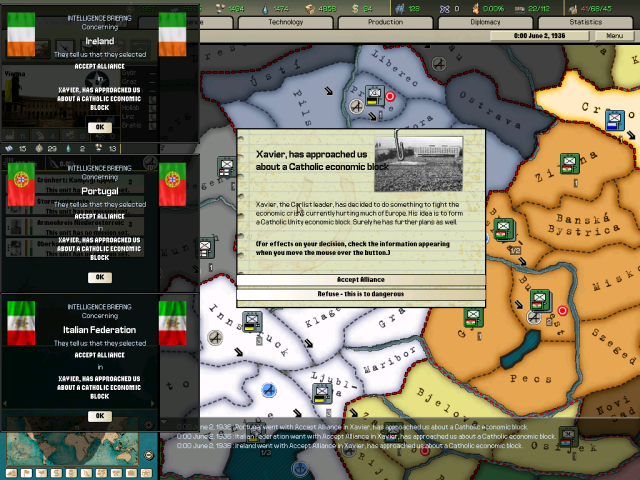Prologue:
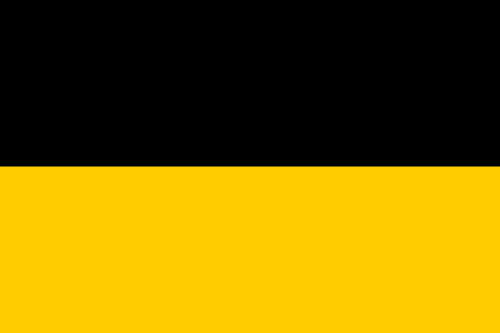
Although Austria was on the winning side of the Weltkrieg, the war’s main impact was to reveal the Empire’s significant weaknesses and utter dependence upon Germany. Over the course of the 1920s one disaster followed another: Emperor Karl died in 1922 causing the throne to pass to his 10 year old son Otto; Austrian industry collapsed in face of competition from German manufactures; and the quarrels of the Czechs and ethnic Germans in Bohemia nearly pushed the Empire into civil war. Finally, the humiliation of having to call in German mediation to resolve the deadlock of the Ausgleich negotiations in 1927, which resulted in the concession of autonomy statutes given to Bohemia and Galicia, seemed to signal the end of Austria as a Great Power.
However, many feel that there is new hope for the Osterreich - now that the Emperor Otto I has come of age and the terms of the ‘Great Compromise’ are to be renegotiated at the 1937 Ausgleich next year. Could this be the time for Austria to throw off her shackles of dependence on Germany and reassert the power of the Habsburg dynasty over her Empire?
Chapter 1: Repairing the Monarchy
Welcome to the Austrian Empire, Population around 12,000,000. The Austrian Empire is but a fragment of its former self, a result of the Austro-Hungarian Civil War. While the civil war fragmented the states, each of them has shown their influence towards Austria, those states being Galicia-Lodomeria, Bohemia, Hungary, Bosnia and to a lesser extent, Croatia (they being a Hungarian puppet state).
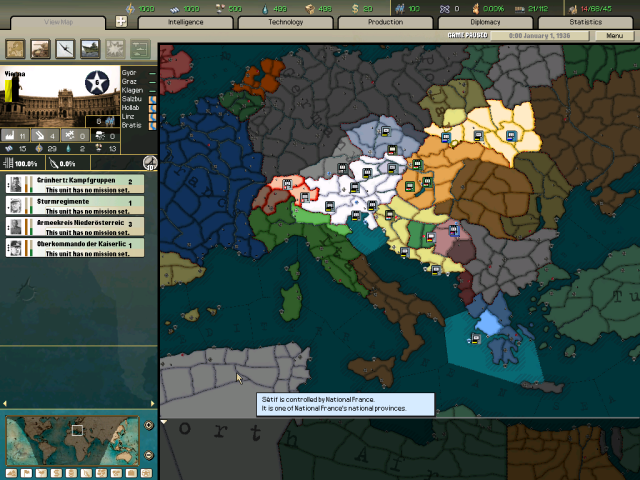
(The Austrian Empire circa 1936, this time I'm more serious here because I'm out of funny things to say.)
The current Austrian Cabinet is led by two people, Scine Kaiserliche und Konigliche Hoheit (His Imperial and Royal Highness) Otto von Habsburg of Austria, and the Minister-President (and Minister of Finance) Count Albert von Mendsdorff-Pouilly-Dietrichstein.

(DYK, Otto von Habsburg is still alive IRL? Yes, he the son of Charles I is currently 97 years old. He is no longer head of the Habsburg house though, having passed that title to his 49-year old son Karl.)
5 days into the start of the New Year, the Kingdom of Galicia-Lodomeria, a pro-Austrian Kingdom north of Hungary declared to both the Kingdom of Poland and the former Austro-Hungarian Kingdoms a deal. In exchange for foodstuffs such as grain and cattle, Galicia would receive either cash or resources. While some nations sent Money to the Kingdom, other nations, like Austria sent resources in the form of Steel, Oil, Energy and Rare Materials. This improved relations between the countries slightly.

(These deals increased the prosperity of the Galician Kingdom.)
2 Months later, the Free State of Central Africa tried to negotiate with the Portuguese Republic over a territorial dispute of their colonies, namely Angola and Mozambique. The Portuguese refused to discuss the matter, claiming that the territories in question belong to Portugal. In response, Mittelafrika declared war on Portugal and began invading the colonial lands.

(The Mittelafrikan Free State made an attempt to take the Portuguese lands, one way or another.)
On April 8th, Ethnic Skirmishes between the Mongolian Empire and the Xibei San Ma Republic nearly led to war. But Ma Fuxiang, seeing enough blood being shed as it is, decided to concede Mongolian-majority lands to Mongolia, thus Mongolia achieved its first political victory, with many more to come.

(This also showed the vulnerable weaknesses of the Chinese States, of which both Germany and Japan would continue to exploit in the years to come.)
On May 5th, A Civil War breaks out in Bolivia, particularly the Capital City of La Paz. This resulted in the defeat of the Presidential Guard and the execution of the last Bolivian President. Alfonso Gumucio Reyes, head of the Revolutionary Nationalist Movement, is made President of the new Socialist Republic of Bolivia.
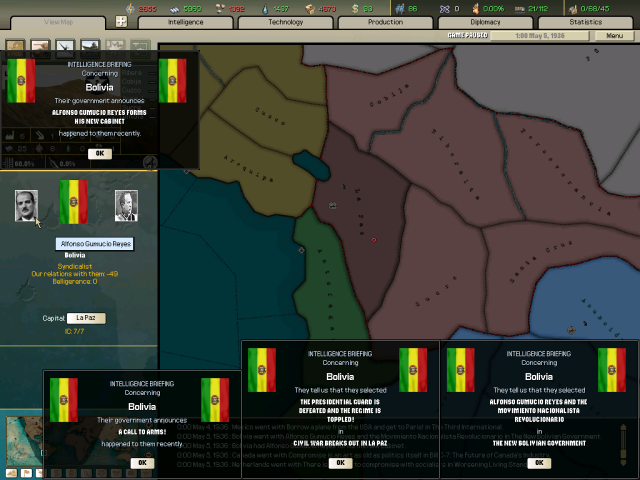
(The Syndicalists managed to gain an important victory here. However, being the lone Syndie nation in South America would only serve to weaken their position.)
A few days later, a similar rebellion took place, starting with the execution of Panamanian President Madrid. As a result, United Provincial troops entered the nation’s capital of Panama City. The weakened Panamanian government, desperate to maintain order, decided to join with the UP. UP President, Juan Bautista Sacasa announced that Panama is now the third republic to join the UP.
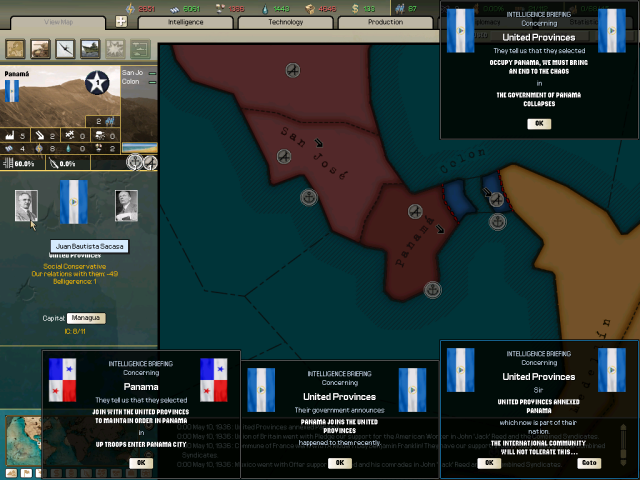
(The United Provinces avoided a scenario where they would possibly be surrounded by Syndicalists in Panama and Centroamerica.)
Francis Xavier Bourbon, the Duke of Parma made trips across Europe, stopping in Dublin, Rome, Lisbon and Vienna to discuss about the Economic bloc. A major choice was to be had with the Austrians. The Bourbons and the Habsburgs were rivals since the 17th century, and although that had changed when the Bourbon Restoration in France fell and Spain fell from prominence, the Habsburgs increased in strength.

Interactive moment 1: Should Austria accept the invitation to the Catholic Economic Bloc, or Refuse it?

Although Austria was on the winning side of the Weltkrieg, the war’s main impact was to reveal the Empire’s significant weaknesses and utter dependence upon Germany. Over the course of the 1920s one disaster followed another: Emperor Karl died in 1922 causing the throne to pass to his 10 year old son Otto; Austrian industry collapsed in face of competition from German manufactures; and the quarrels of the Czechs and ethnic Germans in Bohemia nearly pushed the Empire into civil war. Finally, the humiliation of having to call in German mediation to resolve the deadlock of the Ausgleich negotiations in 1927, which resulted in the concession of autonomy statutes given to Bohemia and Galicia, seemed to signal the end of Austria as a Great Power.
However, many feel that there is new hope for the Osterreich - now that the Emperor Otto I has come of age and the terms of the ‘Great Compromise’ are to be renegotiated at the 1937 Ausgleich next year. Could this be the time for Austria to throw off her shackles of dependence on Germany and reassert the power of the Habsburg dynasty over her Empire?
Chapter 1: Repairing the Monarchy
Welcome to the Austrian Empire, Population around 12,000,000. The Austrian Empire is but a fragment of its former self, a result of the Austro-Hungarian Civil War. While the civil war fragmented the states, each of them has shown their influence towards Austria, those states being Galicia-Lodomeria, Bohemia, Hungary, Bosnia and to a lesser extent, Croatia (they being a Hungarian puppet state).

(The Austrian Empire circa 1936, this time I'm more serious here because I'm out of funny things to say.)
The current Austrian Cabinet is led by two people, Scine Kaiserliche und Konigliche Hoheit (His Imperial and Royal Highness) Otto von Habsburg of Austria, and the Minister-President (and Minister of Finance) Count Albert von Mendsdorff-Pouilly-Dietrichstein.

(DYK, Otto von Habsburg is still alive IRL? Yes, he the son of Charles I is currently 97 years old. He is no longer head of the Habsburg house though, having passed that title to his 49-year old son Karl.)
5 days into the start of the New Year, the Kingdom of Galicia-Lodomeria, a pro-Austrian Kingdom north of Hungary declared to both the Kingdom of Poland and the former Austro-Hungarian Kingdoms a deal. In exchange for foodstuffs such as grain and cattle, Galicia would receive either cash or resources. While some nations sent Money to the Kingdom, other nations, like Austria sent resources in the form of Steel, Oil, Energy and Rare Materials. This improved relations between the countries slightly.

(These deals increased the prosperity of the Galician Kingdom.)
2 Months later, the Free State of Central Africa tried to negotiate with the Portuguese Republic over a territorial dispute of their colonies, namely Angola and Mozambique. The Portuguese refused to discuss the matter, claiming that the territories in question belong to Portugal. In response, Mittelafrika declared war on Portugal and began invading the colonial lands.

(The Mittelafrikan Free State made an attempt to take the Portuguese lands, one way or another.)
On April 8th, Ethnic Skirmishes between the Mongolian Empire and the Xibei San Ma Republic nearly led to war. But Ma Fuxiang, seeing enough blood being shed as it is, decided to concede Mongolian-majority lands to Mongolia, thus Mongolia achieved its first political victory, with many more to come.

(This also showed the vulnerable weaknesses of the Chinese States, of which both Germany and Japan would continue to exploit in the years to come.)
On May 5th, A Civil War breaks out in Bolivia, particularly the Capital City of La Paz. This resulted in the defeat of the Presidential Guard and the execution of the last Bolivian President. Alfonso Gumucio Reyes, head of the Revolutionary Nationalist Movement, is made President of the new Socialist Republic of Bolivia.

(The Syndicalists managed to gain an important victory here. However, being the lone Syndie nation in South America would only serve to weaken their position.)
A few days later, a similar rebellion took place, starting with the execution of Panamanian President Madrid. As a result, United Provincial troops entered the nation’s capital of Panama City. The weakened Panamanian government, desperate to maintain order, decided to join with the UP. UP President, Juan Bautista Sacasa announced that Panama is now the third republic to join the UP.

(The United Provinces avoided a scenario where they would possibly be surrounded by Syndicalists in Panama and Centroamerica.)
Francis Xavier Bourbon, the Duke of Parma made trips across Europe, stopping in Dublin, Rome, Lisbon and Vienna to discuss about the Economic bloc. A major choice was to be had with the Austrians. The Bourbons and the Habsburgs were rivals since the 17th century, and although that had changed when the Bourbon Restoration in France fell and Spain fell from prominence, the Habsburgs increased in strength.

Interactive moment 1: Should Austria accept the invitation to the Catholic Economic Bloc, or Refuse it?






